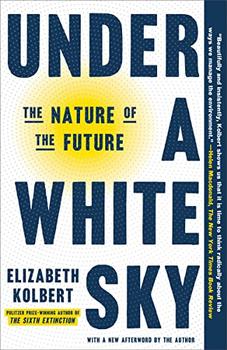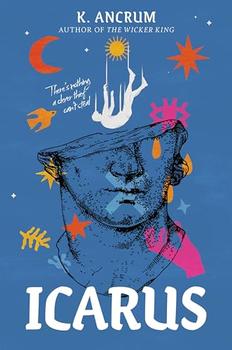Summary | Excerpt | Reviews | Beyond the Book | Read-Alikes | Genres & Themes | Author Bio

Critics' Opinion:
Readers' Opinion:
First Published:
Feb 2021, 256 pages
Paperback:
Apr 2022, 272 pages
 Book Reviewed by:
Book Reviewed by:
Ian Muehlenhaus
Buy This Book
This article relates to Under a White Sky
Genetically modified organisms (GMOs) have received a bad rap. They're banned from being grown or used in food throughout most of Europe. They're caustically labeled on groceries in the United States. And they are frequently despised by foodies, farmers, environmentalists and the devoutly religious alike — for reasons ranging from health, to corporate greed, to technophobia, to ethics.
While there are valid arguments to be made against the use of GMOs, it's important to look at this issue from a balanced perspective. For some, anti-GMO sentiment is based more on anxiety than fact. For example, as Elizabeth Kolbert points out in Under a White Sky, GMO use may be the only way to save Australia from being overrun by toads!
A Brief History of Plant and Animal Modification
You wouldn't be here today if our species hadn't started artificially modifying crops over 10,000 years ago. Almost every food you eat is an artificial modification of an ancient food.
During the Neolithic revolution — 10,000 BCE — humans began to transition from hunter-gatherers to farmers. How, where and why this slow process took place is laid out eloquently in Jared Diamond's Guns, Germs and Steel, but suffice to say, before that time, there weren't crops or domestic animals as we know them today; the reason we now have homes, neighborhoods and cities is because our ancestors selectively bred wild crops and animals to better suit their needs.
For example, the earliest settlers learned to collect and select the seeds of the heartiest plants during harvest to replant the next year, circumventing genetic natural selection for human-favored, "artificial" selection. Over time, crops and yields increased and normalized, allowing humans to predict yields — dependent, of course, on uncontrollable external factors like drought, locusts and floods. This in turn allowed humans to spend less time collecting food and more time making cognitive advances (e.g. math and engineering); coupled with cooking, the farming of crops and the domestication of animals allowed humans to become the Earth's apex species.
GMOs Could Make the World a Better Place
Scientists in the 21st century can do much better than those ancient farmers. Today, 91% of corn in the United States is drought resistant, not due to direct genetic modification but because of industrial seed selection. By looking into seeds' genomes, however, scientists can also use technology to edit genes. This allows them to artificially develop crops to be resistant to certain external factors; for example, locust-resistant wheat, super-yield corn, and more flood-resistant harvests are all now possible through genetic modification.
In general, the genetic modification of animals tends to raise the hair on the back of our mammalian necks more than the modification of crops. Though plants are living organisms too, messing with other animal species — including fellow humans — raises more existential questions such as what does it mean to be a human — or even a conscious — being?
In the West, animal genetic modification is largely controlled by governments and done in research labs. Though some pet fish that glow in the dark have been commercialized, and genetically modified salmon that breed year-round are now sold in stores, dominant Judeo-Christian ideologies on the sanctity of mammalian life largely prevent the wholesale commercialization of genetically modified animals.
Although ethically complex, genetic modification of lab animals is most commonly done to study and help prevent diseases in humans. Researchers can investigate the genes responsible for diseases, and test what impact any changes might have on the spread of various viruses and bacteria. Though a better understanding of which genes are responsible potential treatments can be developed for humans.
Scientists also experiment with genetic modification of animals for at-risk populations or to produce food more efficiently. In recent years, organism modification has been used to create adaptations in domestic animals that have real-world benefits for human populations, such as:
GMOs can also have ecological, environmental and humanitarian benefits. Genetically modified animals are being used to help eliminate invasive species like Asian carp, a type of ivy known as Creeping Charlie, buckthorn, killer bees, Floridian pythons, and the cane toad infestation in Australia mentioned at the start. Genetically modified mosquitoes are already being released to eliminate several of the world's most dangerous diseases, including malaria, dengue fever and Zika. GMO crops are able to increase yields, while drastically reducing carbon emissions and preserving natural habitats. When it comes to humanity, GMO crops can help feed growing populations.
Could GMO use cause new, unforeseen problems? Absolutely. However, this is not a GMO-specific issue. Every scientific achievement has given rise to new problems — from electricity (e.g. carbon emissions) to plumbing (e.g. lead poisoning). GMOs are a powerful tool at our disposal, and with care and ethical oversight, they can be used to benefit humankind — and the Earth in — significant ways.
Filed under Medicine, Science and Tech
![]() This article relates to Under a White Sky.
It first ran in the April 21, 2021
issue of BookBrowse Recommends.
This article relates to Under a White Sky.
It first ran in the April 21, 2021
issue of BookBrowse Recommends.




Your guide toexceptional books
BookBrowse seeks out and recommends the best in contemporary fiction and nonfiction—books that not only engage and entertain but also deepen our understanding of ourselves and the world around us.